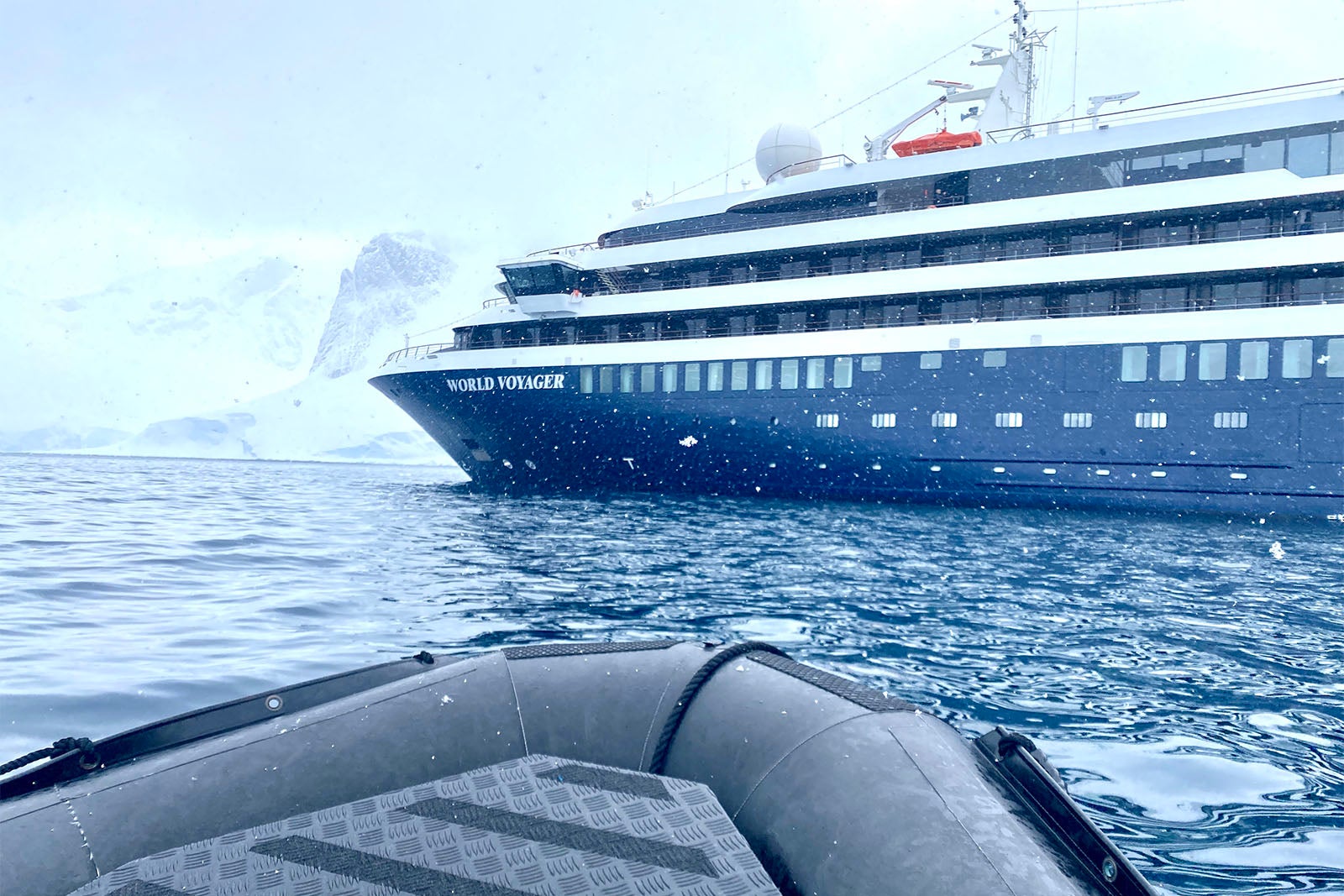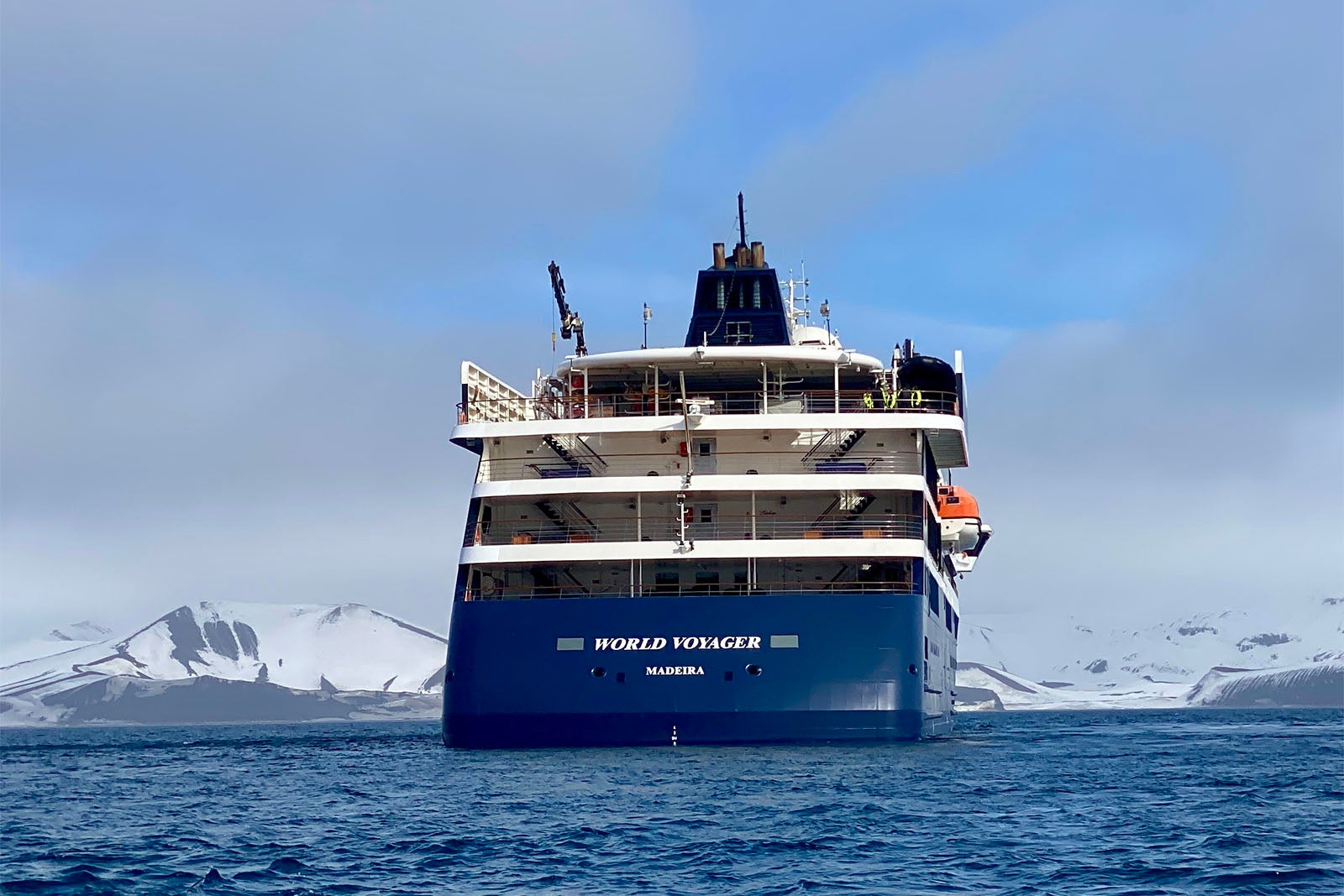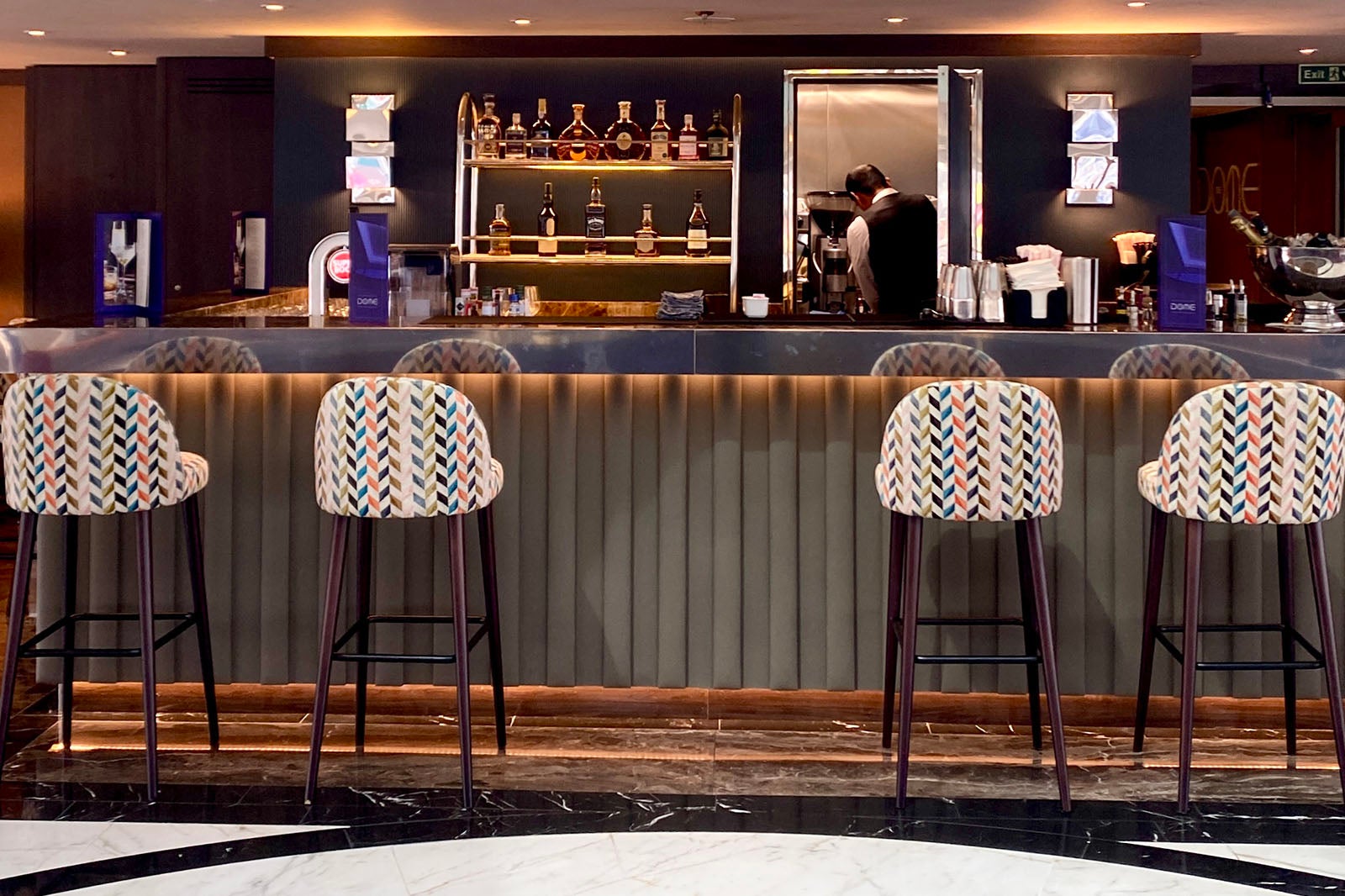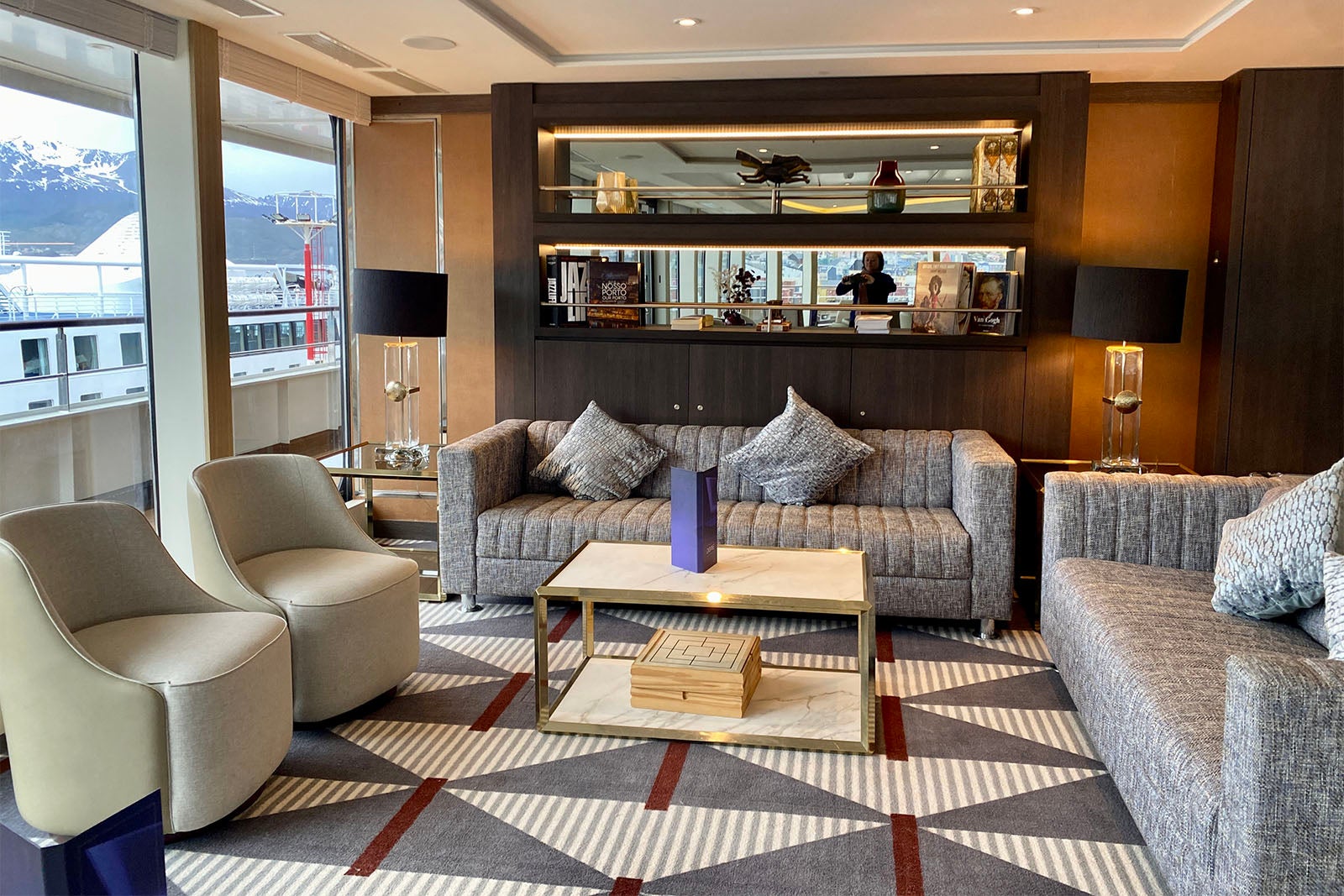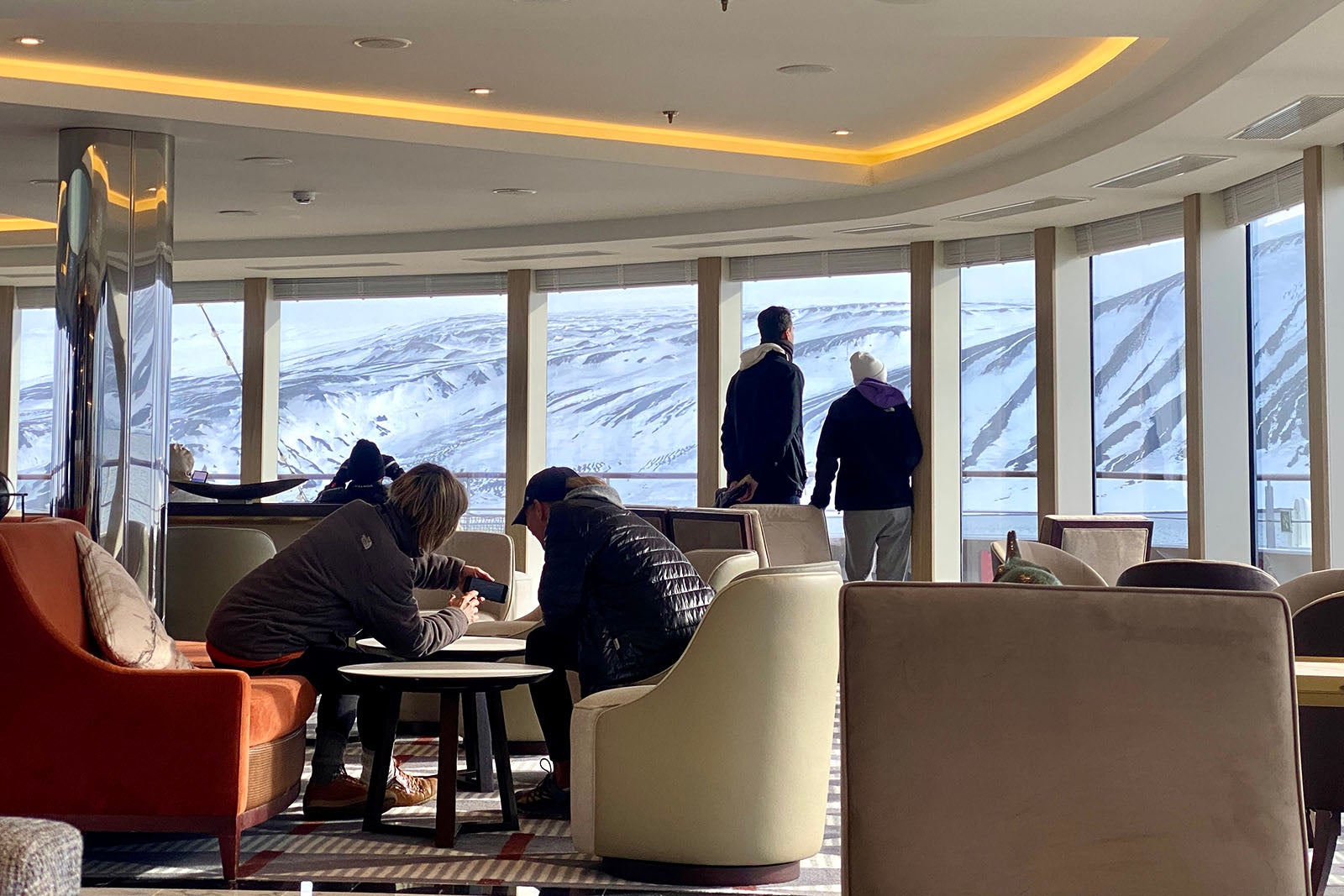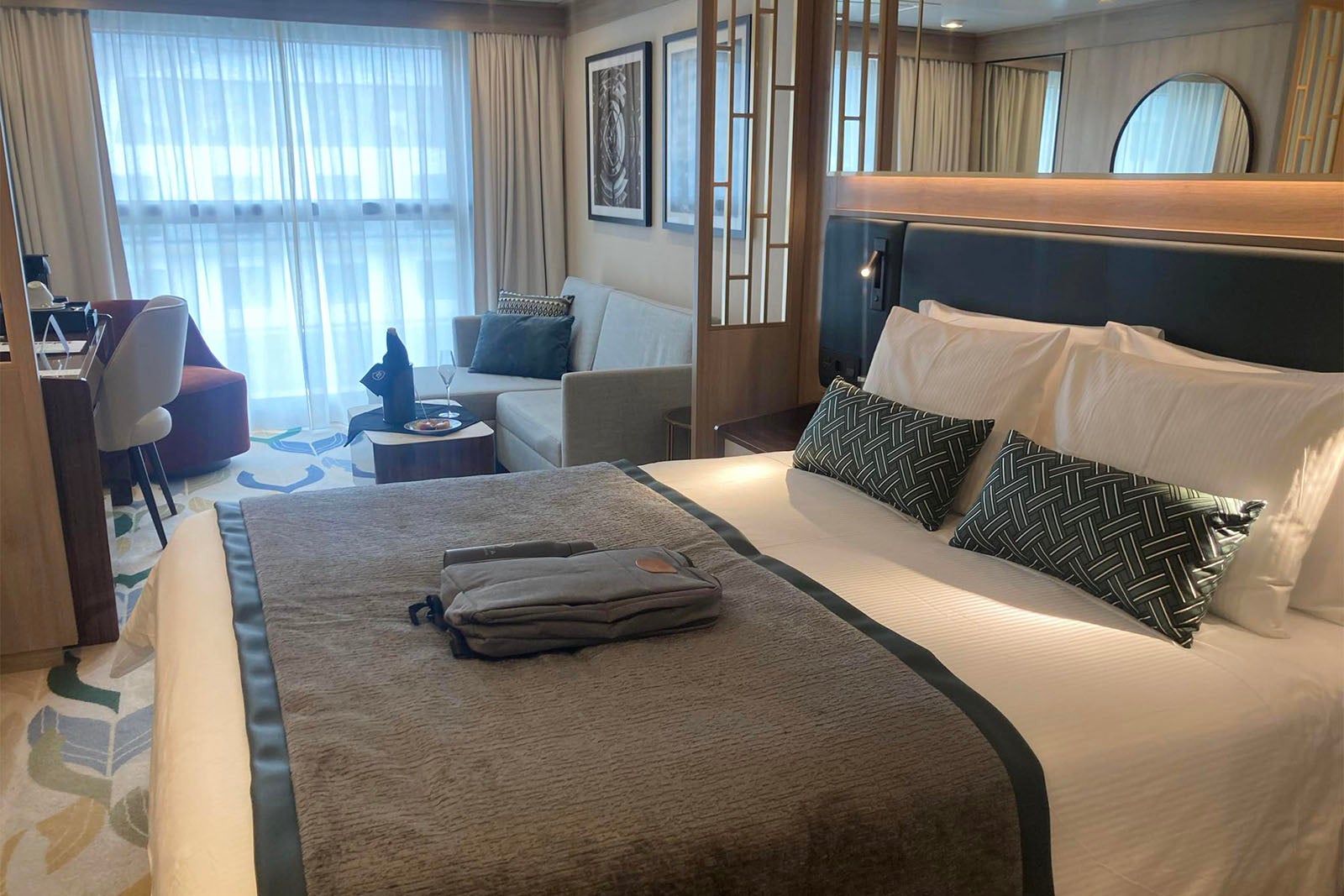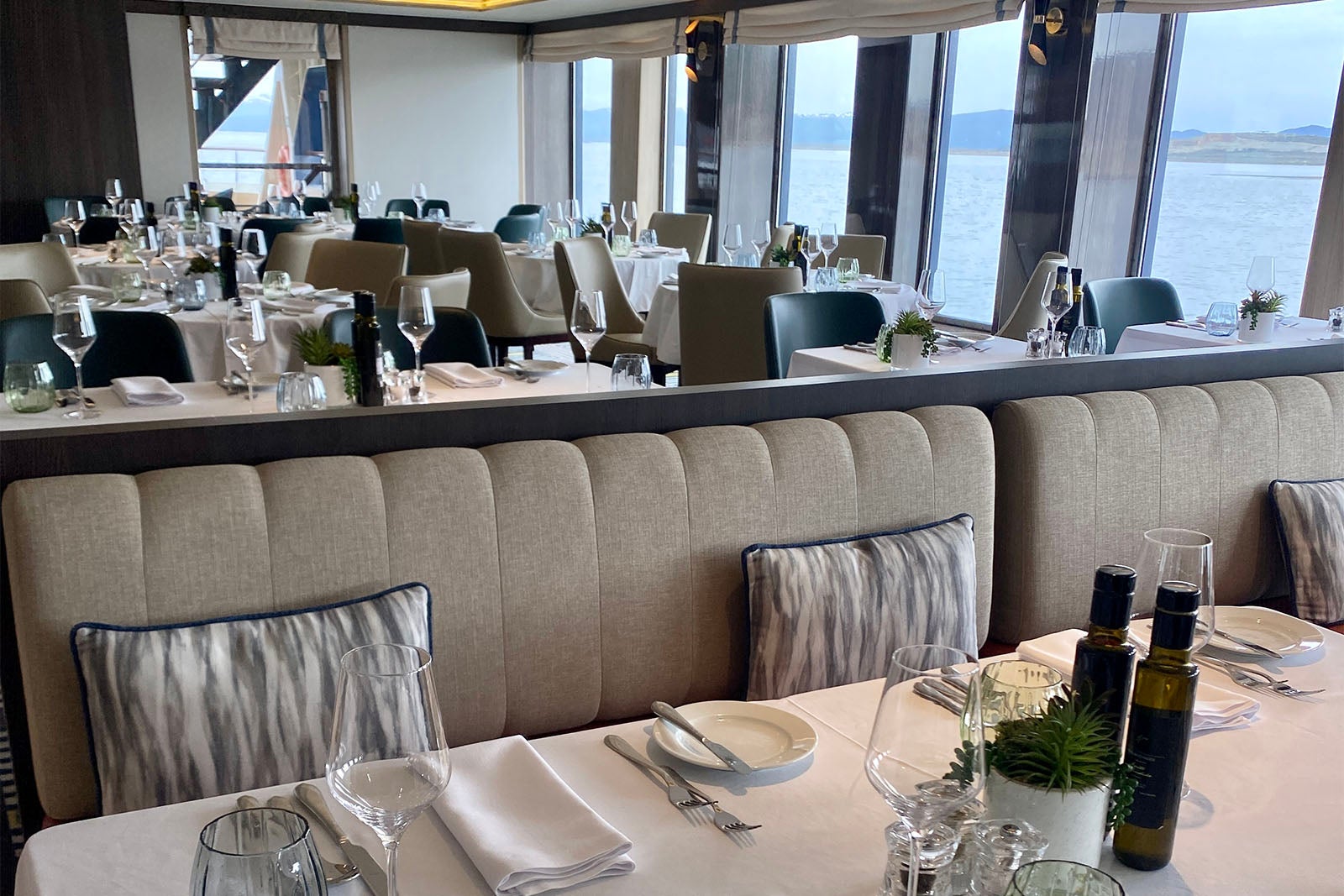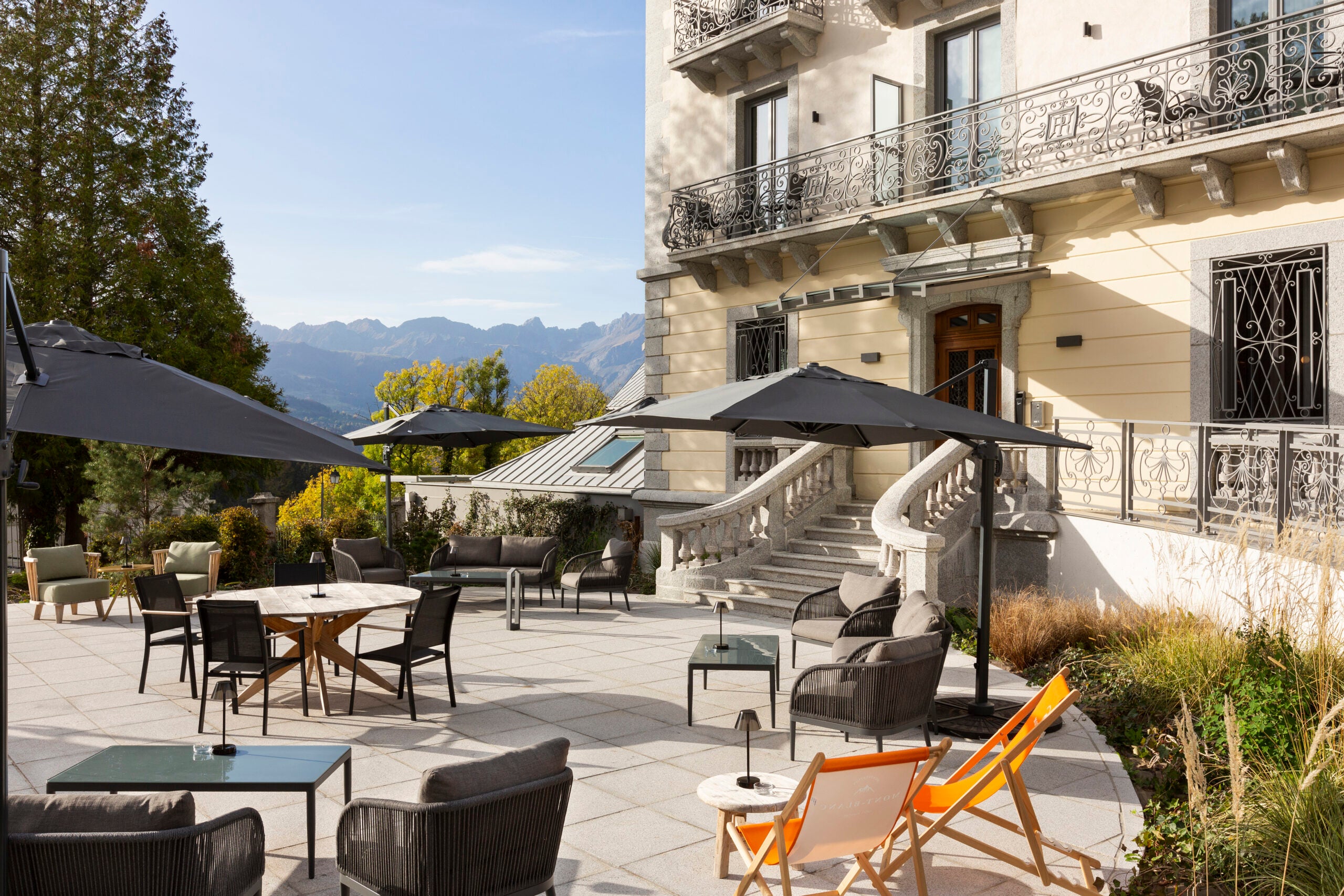First look at World Voyager, the stylish new expedition cruise ship from Atlas Ocean Voyages
You can tell a lot about an expedition ship from the way it handles rough seas and storms.
World Voyager, the third ship for fast-growing newcomer Atlas Ocean Voyages, was put through its paces during a tempest of wind and waves on its recent nine-day maiden voyage to Antarctica.
It handled it with ease.
That’s thanks to the ship’s new, state-of-the-art stabilizing dual Rolls-Royce retractable fins and advanced hydrodynamic design.
For cruise news, reviews and tips, sign up for TPG’s cruise newsletter.
Crossing the fearsome Drake Passage — the violent confluence of three seas between the tip of South America and Antarctica — the ocean pitched, rolled and yawed. It was the dreaded Drake Shake. Waves lept to 39 feet, but we were buffered against the worst of it as we zig-zagged to briefings, polar gear fittings, welcome drinks and dinners.
I got to see those stabilizers in action again in the white continent, flying on the coattails of 100-knot winds. Snow fell sideways. Spectral winds chased jitterbug seas. Onboard, there was nothing but smooth sailing, even on the treadmill in the gym.
Introducing World Voyager
World Voyager is an intimate ship designed for what Atlas Ocean Voyages likes to call “expedition yachting” in some of the most remote pockets of the globe. Right now, that’s Antarctica. Like sister ice-class ships World Traveller and World Navigator, this ship has state-of-the-art sonar that allows it to travel deep into polar regions and Zodiac inflatable boats on board for exploring off the ship.
But the ship doesn’t offer immersive travel only in far-flung locales. In the coming months, World Voyager will head north for warm-weather sailings in the Mediterranean, northern Europe and the British Isles; there, it will swap the Zodiacs for Jet Skis, kayaks and paddleboards.

Daily Newsletter
Reward your inbox with the TPG Daily newsletter
Join over 700,000 readers for breaking news, in-depth guides and exclusive deals from TPG’s experts
The ship can maneuver into small harbors and narrow rivers that bigger ships can’t. This is something Atlas is keen to capitalize on during the coming year with warm-water sailings that invite a deeper connection to food culture and history. New Epicurean Expeditions will be centered on food tours, cooking demonstrations, local chefs and vintners, and wine tastings. I got to sample some of these wines — including a Miraval rose from Provence, France — and can vouch for their excellence.
One of the biggest differences between an expedition ship and some of the bigger luxury cruise ships is the expert team of marine biologists, ornithologists, glaciologists and historians onboard; they enrich daily outings with talks and daily recaps. World Voyager travels with up to 14 expedition leaders. Still, its program is lighter than what you’ll find on the expedition vessels of more established players in the space, such as Lindblad Expeditions, Silversea Cruises and Quark Expeditions.
Still, the enrichment offerings from World Voyager’s expedition team are just part of a wider entertainment program. The program includes afternoon tea, trivia, evening movies, late-night cabaret shows and an always-open and lively Dome observatory bar — an array of diversions you don’t always find on expedition ships.
In this way, the ship straddles big-ship entertainment and small-ship adventure. It’s early days, and the team is still finding its sea legs — not unusual for a new ship. However, there is talk of getting the expedition team to dine with guests.
Related: The ultimate guide to Atlas Ocean Voyages
It’s good value
Traveling to far-flung places with an intimate coterie of like-minded travelers is one of the luxuries of expedition cruising. Atlas Ocean Voyages’ World Voyager is one of the smallest ships of its kind. The 9,935-ton ship has the capacity for 198 passengers, but that number drops to a mere 178 people in Antarctica, with cabins given to guest lecturers and entertainers. Our maiden voyage had only 138.
For such a big-ticket cruise, the crowd was relatively young. I put this down to Atlas’ current offer that allows the second guest to sail free; the deal includes overnight accommodation and return private charter flights from Buenos Aires to Ushuaia, Argentina. It’s a striking value for a nine-night Antarctica trip, starting at just $10,599 per person.
Like most ships at the high end, Atlas includes a lot in its base price. Onboard accommodations, all meals, most drinks, gratuities and shore excursions are part of the ticket price, plus round-trip airfares from select U.S. and Canadian gateways. Emergency medical evacuation insurance is also included — something few other expedition companies offer.
What’s not included in Atlas fares are shelf liquors (a shot of Belvedere vodka will set you back $7), premium wines or Champagne. Shipboard Wi-Fi also comes at a steep price (500MB for $45, 1GB for $80 or 5GB for $350) and can only be used on one device. It’s an irritation when you consider most ships let you switch between devices — and that many luxury expedition ships in the same space offer shipboard Wi-Fi for free.
Related: I jumped off a cruise ship in Antarctica and lived to tell the tale
World Voyager is made for design lovers
Cruise ship decor switches from cookie-cutter elegance to such dizzying colors and patterns you’d be forgiven for thinking a toddler was let loose in the craft cupboard.
Not World Voyager. The ship exudes sophistication.
Built in 2020, the ship initially sailed for Germany-based Nicko Cruises, owned by the same Portuguese company that owns Atlas Ocean Voyages. When the ship switched allegiances, it also received a design refresh.
The result is a meet-cute of Scandinavian minimalism and art deco gorgeousness that wouldn’t look out of place in a boutique hotel.
It marks a departure for Atlas, which partnered on its first two ships with Portuguese design firm Oitoemponto. The glossy mahogany wood paneling and decorative European fabrics are gone, traded for a lighter, more pared-back look; it favors Scandi-inspired blonde wood, black and white marble floors, geometric carpets, rich rust velvet feature lounges, gilt highlights and glorious pops of gemstone color.
The ship is easy to navigate, with a floor plan that flows seamlessly between venues. Deck 4 is home to the main public spaces, including the lecture auditorium, lounge bar, lobby, cafe (a quick stop for juice shots, smoothies, espresso coffee, pastries and hearty snacks), a small shop and the main dining room.
A small, well-equipped gym is tucked away on the port side. Meanwhile, the aft is home to a tiny L’Occitane spa with two treatment rooms, the gifted hands of masseur Akom, a chill lounge and a sauna with a glass wall.
The ship offers views for days
Nature is the star attraction on any expedition cruise, something Atlas knows well. The entire ship is dripping with indoor and outdoor spaces that deliver dress-circle views of icebergs, whales, birdlife and dazzling sunsets.
The Dome observatory lounge offers views in spades. Situated at the front of the ship, on the highest deck, the lounge boasts curved floor-to-ceiling glass and a glorious wraparound viewing platform, both of which serve up spectacular 270-degree views.
Two decks below is Water’s Edge: another stunning spot at the ship’s bow, with magical views on three sides and a heated wraparound bench (a welcome seat on cold polar days). Three other viewing platforms — at the rear of Madeira restaurant on Deck 4 and on passenger decks 5 and 6 — make for an easy exit whenever nature beckons.
Related: Antarctica gear guide: What you need to pack for a trip to the White Continent
Cabins offer front row seats to the action outside
In polar climates where the temperature regularly dips below 32 degrees, a private balcony would seem unnecessary. No surprise then that the ship’s Horizon Staterooms — the type of cabin that I experienced while on board — earn points for their generous 270 square meters of temperature-controlled bliss. A step up from the Veranda Staterooms with their standard cruise ship balconies, these rooms claw back 55 square meters of icy outdoor space for just a little more money.
The Horizon Staterooms feature what Atlas calls a Juliette balcony — a wall of floor-to-ceiling glass with an electric top-drop window, easily controlled by the touch of a button. (Some river cruise ships have these, and they’re akin to the “infinite verandas” on Celebrity Cruises’ Edge Class ships.)
The experience was like being in an IMAX Theatre. From my room, I had a front-row seat to Antarctica’s larger-than-life natural drama. Window down, I watched petrels coast the Drake Passage, the roar and tang of the sea outside delivered to me in 3D to counteract the pitching swell. I saw whales, cartwheeling penguins and an iceberg bigger than an apartment block.
Cabins come with a queen-size bed and Portuguese linens, a stocked minibar (beer and soft drinks only), Ksumi teas, still and sparkling water in reusable glass bottles, and a Nespresso machine. In-room binoculars are a nice touch.
Bathrooms feature L’Occitane toiletries and a walk-in mosaic glass shower with a rain head, handheld wand and body jets. Storage overall seemed on the small side for two people, but the main drawback was noise. My room was portside in the back, and it was so noisy that the clanking of the engine regularly woke me up.
World Voyager offers two- and three-person Horizon and Veranda staterooms, along with three categories of one-bedroom suites. These upgraded rooms feature extra floor space, a large balcony, a luxuriously deep bath, additional wardrobe space and the greatest luxury of all: a personal butler.
Related: Everything you want to know about cabins and suites on Atlas Ocean Voyages ships
The food onboard is sustainable — and delicious
I found a lot to love about the food on board World Voyager, including the plant-based and zero-waste menus rolled out across the fleet.
It’s the kind of sustainable dining that is on trend with luxury travelers wanting to tread more lightly.
Austrian-born executive chef Rene Aflenzes is behind the holistic menus found throughout the ship that champion slow food, molecular gastronomy and zero-waste principles. It’s truly a root-to-stem and peel-to-core mindset about food prep. Vegetable skins are dehydrated and turned into soup seasonings and garnishes. Whole fruit is magicked into delectably sweet concoctions.
It’s part of an ambitious long-term plan to bring a true nose-to-tail food philosophy to the high seas.
Juice shots, smoothies, house-made Bircher muesli, vegan oat slices, nutritious muffins and hearty snacks are the mainstay at the grab-and-go cafe, Paula’s Pantry; it also offers espresso coffee, donuts and pizza slices.
The buffet lunch in the Madeira dining room features a dedicated vegan salad station. Madeira becomes an a la carte restaurant in the evening. Along with a modern menu, it offers a selection of plant-based starters, mains and desserts, an “always available” plant-based steak and a good sprinkling of zero-waste dishes. Most were good. The salads were a bit hit-or-miss.
In a nod to Atlas’ Portugal-based parent company, Mystic Cruises, the menu also features a handful of typical Portuguese dishes.
Meat lovers will enjoy meals in the main dining room and at Deck 7’s poolside 7Aft Grill, where meat is seared over Josper coals until smoky. In a coup for Atlas, the beef is from the same butcher as Argentina’s famed Don Julio restaurant, ranked number 19 on the 2023 list of the World’s 50 Best Restaurants.
Bottom line
Atlas Ocean Voyages’ new World Voyager is built for adventure, without the stuffiness that can come from more serious expedition ships. It strikes the right balance between an expedition cruise vessel and a more traditional luxury ship, with late-night entertainment and daily Zodiac outings. Give it a go while fares remain one of the better values in expedition cruising.
Planning a cruise? Start with these stories:

